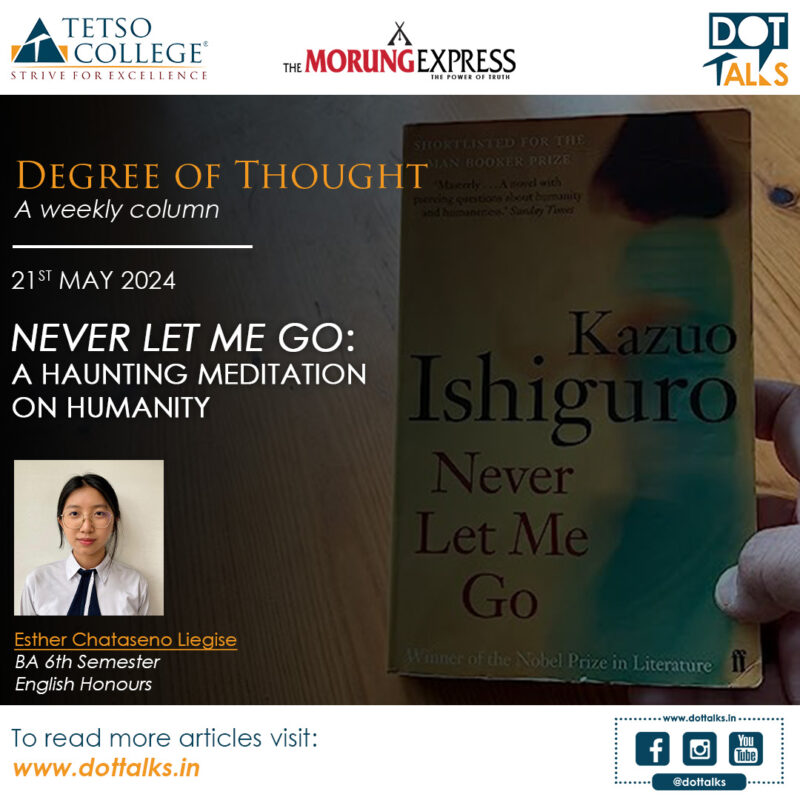
Never Let Me Go: A Haunting Meditation on Humanity
Never Let Me Go, by British novelist and Nobel Laureate Sir Kazuo Ishiguro, is a beautifully crafted novel that delves into the depths of human emotion and existential questioning. The novel is known to have been shortlisted for the 2005 Man Booker Prize (an award Ishiguro had previously won in 1989 for The Remains of the Day), for the 2006 Arthur C. Clarke Award and for the 2005 National Book Critics Circle Award. Set in the dystopian version of a world that mirrors our own, the story follows Kathy, a young woman who reflects on her upbringing in Hailsham, a boarding school with a dark secret.
Ishiguro’s ventriloquism announces itself in the novel’s first lines: “My name is Kathy H. I’m thirty-one years old, and I’ve been a carer now for over eleven years. That sounds long enough, I know, but actually they want me to go on for another eight months, until the end of this year.” Kathy is a “carer”, and the notion of the “caring professions” represents precisely that elision of the institutional and the personal that generates the undertone of disturbance in much of Ishiguro’s work. Kathy calls the people she cares for “donors”, and on the third page she says of one of them: “He’d just come through his third donation, it hadn’t gone well, and he must have known he wasn’t going to make it.” The sinister elision style portrayed by Ishiguro here is swiftly clarified, in that this is a book about evil, the evil of death, the evil of banality: “he must have known he wasn’t going to make it.”
At the heart of the narrative lies a profound exploration of identity and personhood. Ishiguro navigates the complexities of the characters’ existence as clones raised for organ donation, provoking readers to ponder the essence of humanity and the ethical implications of their treatment. The novel takes place in the late 20th century, in an England where human beings are cloned and bred for the purposes of harvesting their organs once they reach adulthood. They continue to do so until they “complete’”, which is a euphemism for death after the donation of three or four organs. The “clones” are reared in boarding school-type institutions: much is made, in the clone community. The novel essentially asks, how do you live with the knowledge that you are not considered a human being but simply a consumer resource? Through Kathy’s introspective narration, readers are drawn into a world where the boundaries between what it means to be human and what it means to be expendable blur, leaving behind a lingering sense of unease and contemplation.
Love and relationships permeate the novel, adding layers of emotional depth to the characters’ experiences. The tragic romance between Kathy, Tommy, and Ruth serves as a poignant reminder of the fleeting nature of happiness and the enduring power of connection in the face of adversity. Ishiguro’s portrayal of these relationships is achingly authentic, capturing the intricacies of human longing and vulnerability with sensitivity.
Never Let Me Go also serves as a poignant commentary on societal norms and the consequences of unchecked scientific advancement (perhaps the equivalent of the development of Generative Artificial Intelligence today). Through the lens of speculative fiction, Ishiguro shines a light on the darker aspects of human nature, prompting readers to confront uncomfortable truths about exploitation, inequality, and the fragility of life itself. As Tommy reflects on their purpose as organ donors, he muses, “We all complete. Maybe none of us really understand what we’ve lived through, or feel we’ve had enough time.” This reflects the existential dread and resignation felt by the clones as they grapple with the inevitability of their fates.
What sets Never Let Me Go apart is its ability to evoke a profound sense of melancholy and longing that lingers long after the final page. With its mixture of dystopia, coming-of-age narrative, and social commentary, the novel is thought-provoking and emotionally resonant and challenges readers to examine their own values and beliefs. Ishiguro’s prose is evocative, weaving a tapestry of memory, loss, and longing that resonates with readers on a deeply emotional level. It not only depicts the scathing critique of human arrogance but presents to its readers a moral examination of how we treat the vulnerable and different in our society. Never Let Me Go, like the clones it portrays, has in the end something of a double nature, for it both attracts and annihilates. Or perhaps it is a book that requires two readers, the reader who can be blind to its ugly visage, and the reader who can see into its delicately conflicted soul. For those who perceive the latter, the novel’s bleak horror will leave a bruise on the mind, a fetter on the heart.
Degree of Thought is a weekly community column initiated by Tetso College in partnership with The Morung Express. Degree of Thought will delve into the social, cultural, political and educational issues around us. The views expressed here do not reflect the opinion of the institution. Tetso College is a NAAC Accredited UGC recognised Commerce and Arts College. The editorial team includes Chubamenla, Asst. Professor, Dept. of English and Rinsit Sareo, Asst. Manager, IT, Media & Communications.
For feedback or comments please email: dot@tetsocollege.org

